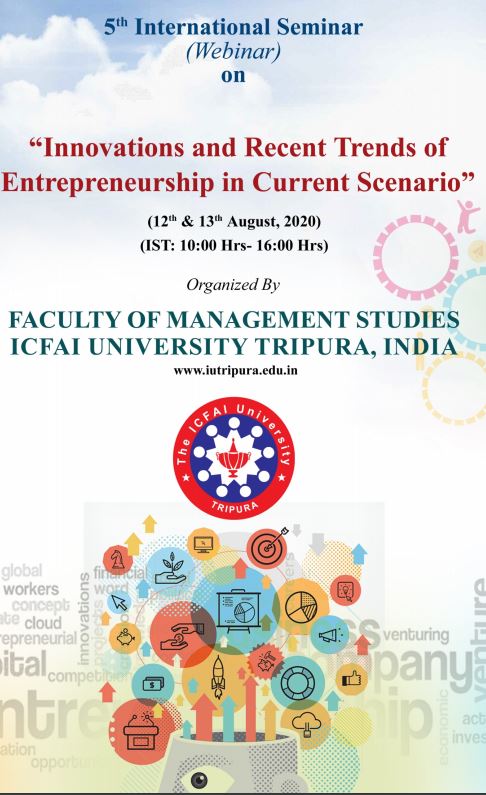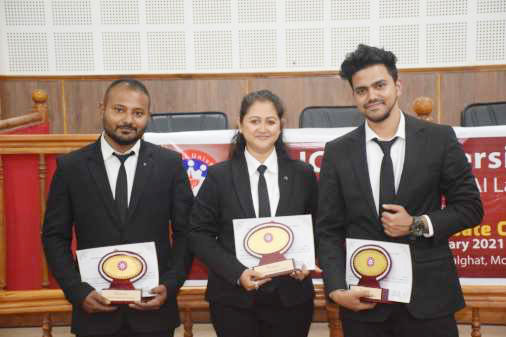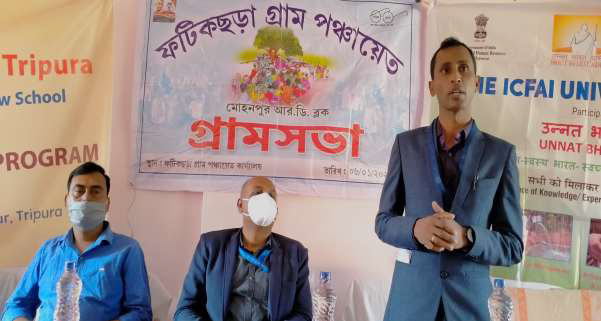About the University
The ICFAI University, Tripura is popularly known as The ICFAI University, Tripura has been established through an act of the State Legislature (Tripura State Legislature Act 8 of 2004). The University is recognized by UGC under Section 2 (f) of 1956 and the University is empowered to award degrees under Section 22 of UGC ACT, 1956. The University is currently offering forty-seven programmes in Management, Commerce, Engineering, Law, Teacher Education, Special Education, Physical Education, English, Yoga and Library Science etc. The University strives to provide quality education with an objective to provide the students with an appropriate combination of conceptual framework and practical insight into managerial, commercial, technological, legal challenges and business opportunities for grooming entrepreneurial initiatives.
Preamble
Recently, COVID-19 has spread over more than 210 countries, infecting beyond 2 million people, with more than 1,37,000 fatalities. As we know, India has a soaring population density combined with poor hygiene standards and also deprived health infrastructure, which makes it more prone to the pandemic. There are many questions yet to be answered. Some of them are- What would be the para11e1 solution to the livelihood crisis? How the activities can be boosted up for entrepreneurs? Even the economists warn that an extended lockdown would cause even more havoc to employment, the economy, and livelihood, the dilemma is whether to save people or livelihood. From time to time, NITI Aayog Govt. of India gave a much convincing statement that “India should improve its disaster management preparation and ensure the availability of resources so that the country doesn’t have to choose options among the people, life, and livelihood”. We can understand that the COVID-19 pandemic is the defining global crisis of the present time and the greatest global humanitarian challenge for a livelihood the world has ever faced. The hiccuping business is declining the entrepreneur’s motivations. The government is taking measures and started PM Garib Kalyan and Atma-Nirbhar Schemes. Keeping in view of the present scenario, India has moved promptly, implementing a proactive, nationwide unlocking. However, the migration of the unorganized sector laborers has drawn our attention to urgent inclusive growth necessities. Innovation, research, science, and technology will form the pillars of a knowledge-based, highly productive, and competitive economy, driven by entrepreneurs and leaders in a business-friendly environment where public and private sectors form effective partnerships. In this context, the seminar proposes to highlight the challenges of entrepreneurs in the current scenario and identify innovation that can be adopted in the global context to build up a conceptual and practical understanding of ‘new normal’ for sustaining MSMEs and other enterprises, foster employment and economy in the current scenario.
Objective of the Webinar
The objectives of the seminar are to bring together academicians, researchers, entrepreneurs, corporate executives, policymakers to share their ideas, views, and experiences on the emerging challenges in the field of entrepreneurship and livelihood in the current scenario and long-term solutions to some of the key business challenges arising in the globalized economy.
Sub Themes of Webinar
- Community-based Entrepreneurship
- Corporate Entrepreneurship
- Entrepreneurial Challenges to Pandemic (COVID-19)
- Entrepreneurship in MSME Sector
- Family Business in Entrepreneurship
- Innovative Approaches in Creating Livelihoods
- Issues related to Rural Economy and Livelihood
- Marketing and Value Chain for Sustainable Rural Livelihoods
- Role of Local Self-Government in Sustainable Rural Livelihoods
- Rural Sustainable Livelihood- Issues, Challenges and Policy Perspectives
- Science and Technology in Entrepreneurship
- SHGs and Social Entrepreneurship
- Sustainable Livelihood for Skilled Human Resources
- Women Entrepreneurship
- Sectoral Entrepreneurship like- Agripreneurship, Aquaentrepreneurship Digital Entrepreneurship, Edupreneurship Technopreneurship, Tourism Entrepreneurship, etc.
- Other Relevant Areas.







